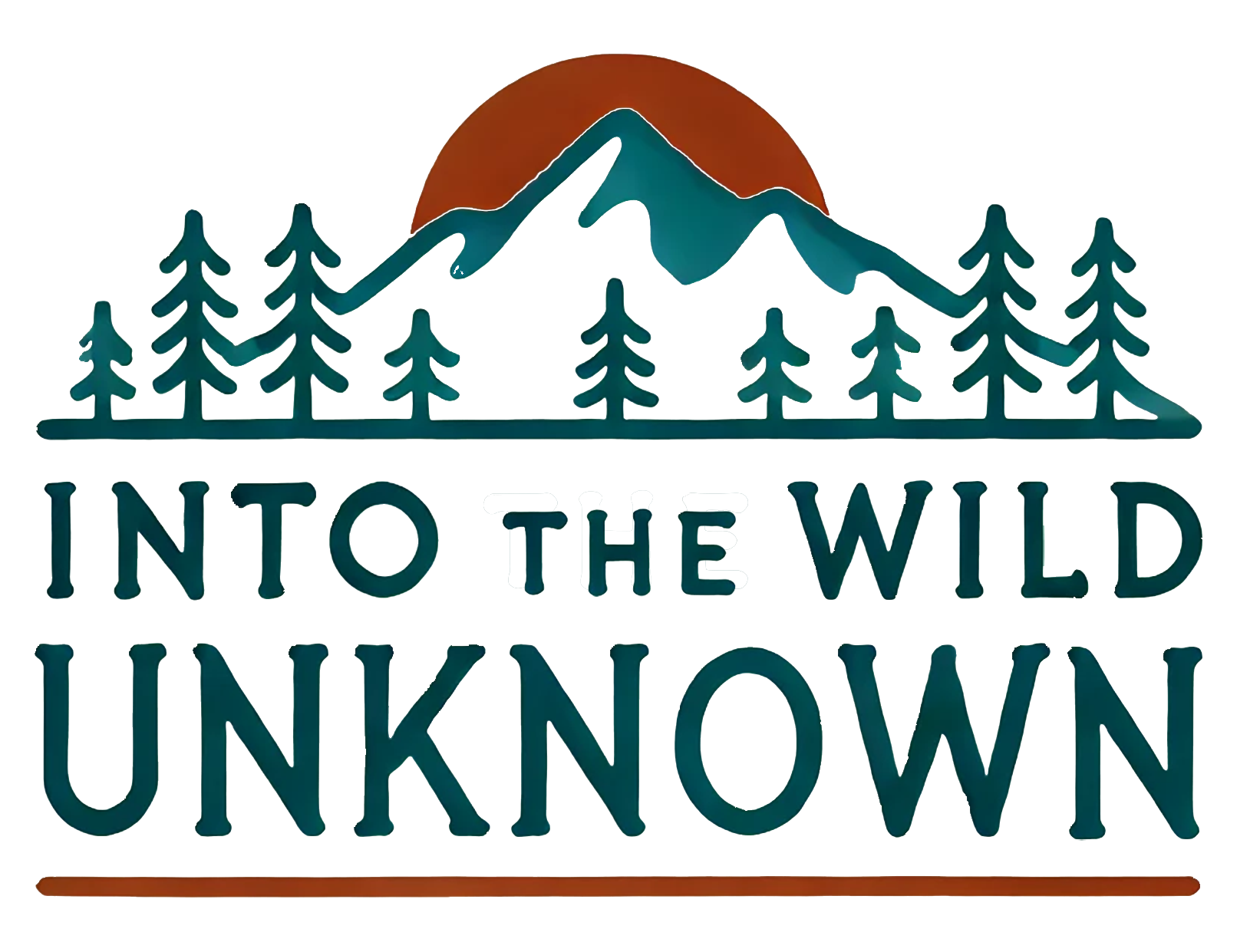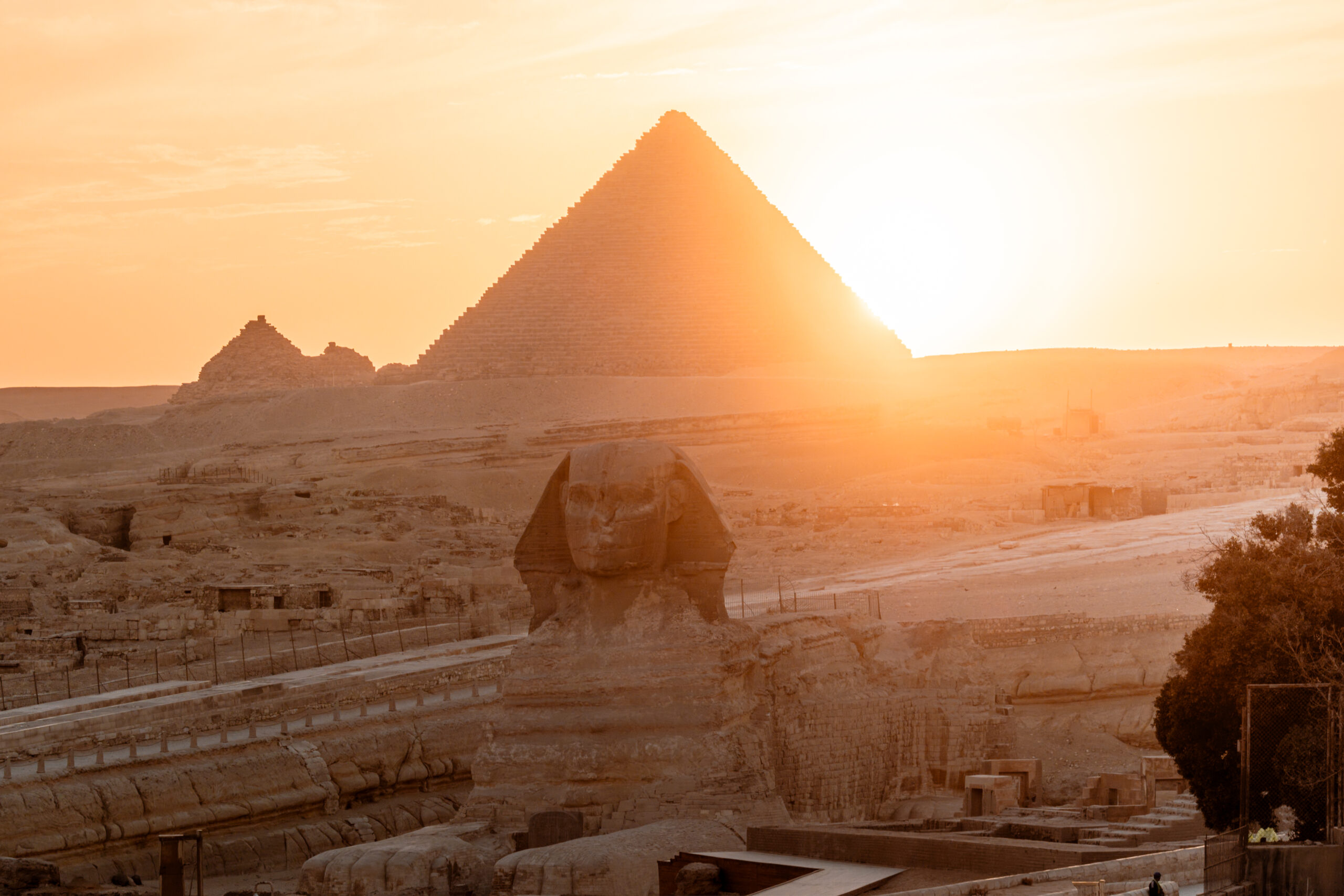The Pyramids of Giza, one of the Seven Wonders of the Ancient World, are an awe-inspiring testament to ancient Egyptian engineering and ingenuity. Located just outside Cairo, these monumental structures, especially the Great Pyramid of Khufu, have stood for over 4,500 years, drawing travellers from around the world. While many visitors opt for pricey guided tours, it’s entirely possible to visit the Pyramids of Giza independently and on a budget, without getting stuck in a group or falling prey to common scams.
This guide is for the budget backpacker looking to explore the Pyramids on their own terms. Whether you’re a history lover, an adventure seeker, or ticking off a major bucket list landmark, you’ll find practical tips on how to get there cheaply, avoid tourist traps, and make the most of your experience, all without overspending.
How to Get to Giza from Cairo on a Budget
Getting to Giza is straightforward and cheap if you know the local transport options. Giza is actually part of Greater Cairo, so if you’re already in the city, you’re not far from the Pyramids.
From Downtown Cairo to Giza by Metro + Microbus
The cheapest and most local way to get to the Pyramids is by taking the Cairo Metro. Hop on Line 2 (the orange line) and get off at Giza Station. A metro ticket costs just a few Egyptian pounds depending on distance. Once at Giza Station, you can take a microbus or shared minivan heading toward the Pyramids. These local minibuses will cost around 10 EGP, and they’ll drop you near the entrance of the Giza Plateau.
By Ride-Hailing Apps: my chosen option
If you prefer a more comfortable option, you can use a ride-hailing app like Uber, Careem, or the local alternative, inDrive. Personally, I had issues using Uber when I first arrived in Cairo. The drivers kept messaging me insisting I pay in cash and often tried to double the original fare. After cancelling on at least five drivers who pulled the same move, I gave up on Uber and switched entirely to inDrive for the rest of my time in Egypt. From downtown Cairo, a ride to the Pyramids should cost around 100 – 200 EGP, depending on traffic and the time of day. This can be a great option if you’re travelling with others and can split the fare.
Avoid Traditional Taxis
While taxis are readily available, many don’t use the meter and will try to overcharge tourists. If you do take one, agree on the price before getting in and be prepared to negotiate. That said, ride-hailing apps are usually a lot less hassle and more reliable anyway.
Where to Stay Near the Pyramids on a Budget
Staying in Giza for a night can be a good idea if you want to visit the Pyramids early in the morning, especially to beat the crowds and the heat. However, be cautious since many budget accommodations in the area have misleading reviews and photos on Booking.com. In reality, the places are often very dirty and look nothing like what’s advertised.
I had booked a hotel near the Pyramids for two nights, hoping to wake up with a view and walk straight to the entrance. But when I arrived in the middle of the night, they checked me in, took my passport and payment, and then told me my room wasn’t actually at that hotel, but at another one entirely. I argued, explaining I chose the hotel specifically for its location, but they insisted the other property was “even better” and “close to another entrance,” showing me pictures and hyping it up. They called a taxi, handed me an envelope to give to reception, and off I went.
Surprise: the “other hotel” was a 45-minute walk from any entrance to the Pyramids, completely defeating the purpose of staying in Giza. But it was 2 a.m., I was exhausted, and I just needed sleep, so I decided to deal with it the next morning.
Still frustrated, I went to reception the next day and said I wanted to leave and get a refund for the second night. They called the original hotel, who claimed I wasn’t entitled to any refund. I was furious. So I went back to the hotel I had originally booked and demanded they return my money. After a tense back-and-forth, they finally agreed.
I’ve travelled a lot, and this was a first: booking a hotel and being secretly placed in a completely different property far away. I’m sharing this so you can be on alert. Even the worst hotels in Giza somehow have really high ratings (mine had an 8.9 with over 700 reviews!). So, take reviews with a grain of salt and double-check everything.
After this terrible welcome to Egypt, I moved to Seven Pyramids View Inn . It wasn’t exactly a budget stay, but the staff were friendly, and the room was decent. And most importantly, it was right next to the entrance with a stunning rooftop terrace overlooking the Pyramids and the Sphinx. Honestly, that view made up for a lot.
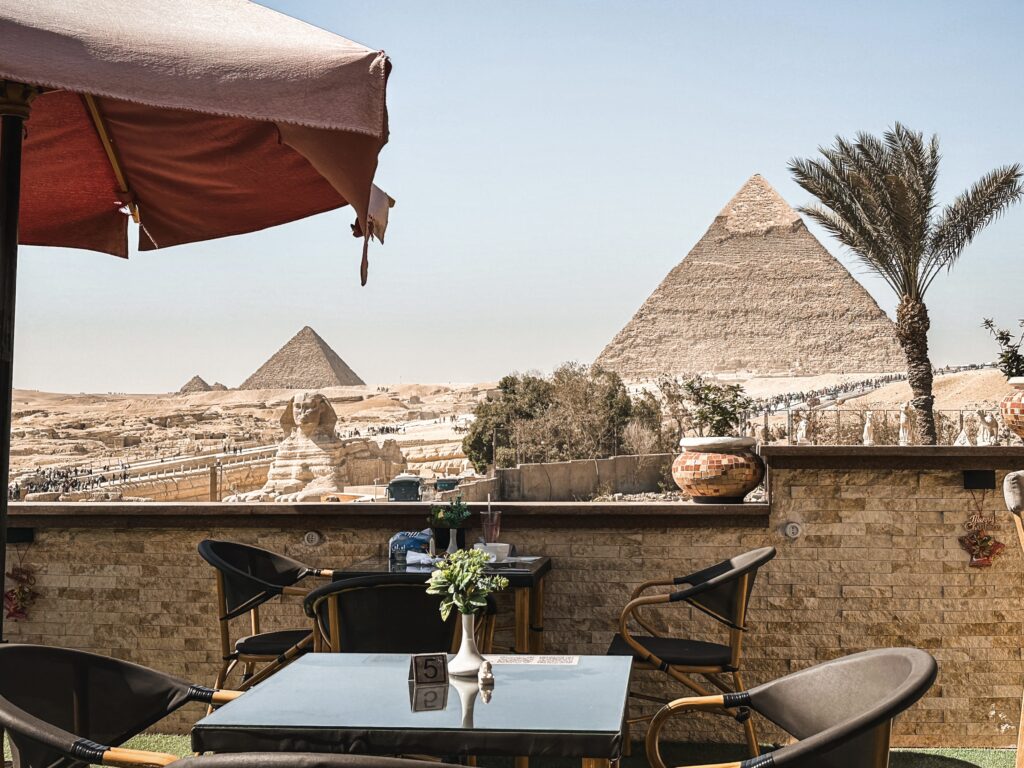 Terrace Views of my Hotel in Giza
Terrace Views of my Hotel in Giza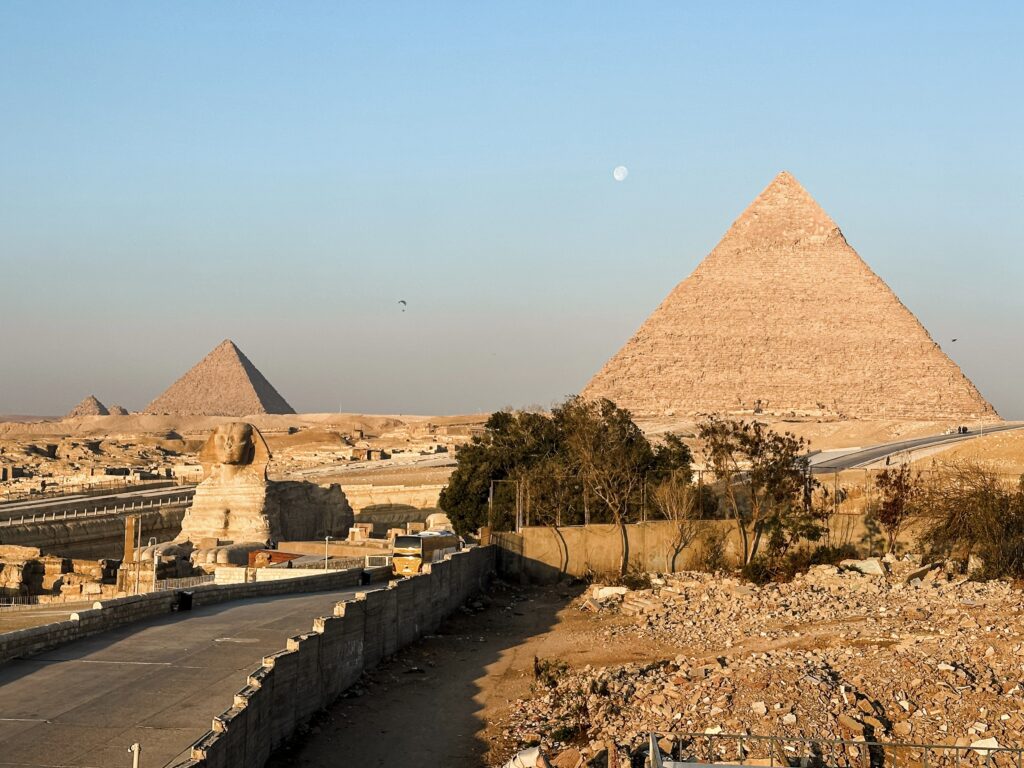 Views from the Hotel’s Terrace at Sunrise
Views from the Hotel’s Terrace at Sunrise
How to Explore the Pyramids on a Budget
Visiting the Pyramids of Giza doesn’t have to cost a fortune. If you avoid the overpriced tours and come prepared, it can actually be one of the cheapest major attractions in Egypt. I’d advise you to buy your ticket here in advance to avoid the queues. Pro tip: If you have a Student Card, your ticket will cost half.
Entrance Fees
The general entrance ticket to the Giza Plateau costs 700 EGP (price in Feb 2025). This ticket gives you access to the area where you can walk around and see all three pyramids, the Sphinx, and the surrounding tombs from the outside. If you want to go inside the Great Pyramid (Khufu), it’s an additional 1500 EGP and the 280 EGP for the Menkaure Pyramid. I personally skipped both as I read that there’s not much inside apart from a narrow tunnel and an empty chamber. In addition, it isn’t a great experience if you’re claustrophobic.
Skip the Camel and Horse Rides
You’ll be constantly approached by vendors offering camel or horse rides around the site, often at inflated prices. While the idea of riding a camel in front of the pyramids sounds iconic, the animals are very mistreated (read about it in this article of the NY Times), and the prices can often come with hidden fees. Walking is completely doable and, most importantly, free. Honestly, it’s better as it gives you more freedom to explore at your own pace.
Avoid Unofficial “Guides”
Be prepared for people trying to act like they work at the site, offering unsolicited “tours” or “help” and then demanding a tip. Unless you’re looking for a professional guide (which you can book separately in advance if needed), politely decline and keep walking. Always agree on a price before accepting any kind of service.
Bring Snacks and Water
There are a few overpriced food and drink stalls near the entrance, but the selection is limited and expensive for what you get. Bring your own snacks and plenty of water, especially, if you’re visiting in the warmer months.
Walk Around the Plateau
Don’t just take the standard photos from the main parking area. The Giza Plateau is huge and there are lesser-known spots around the back where you can get incredible panoramic views of all three pyramids, often without any other tourists around. Just be prepared for a bit of walking through the sand!
Time Your Visit
Try to arrive as early as possible, ideally right when it opens. You’ll avoid the worst of the heat, have fewer scammers to deal with, and get better photos with fewer crowds. Plus, if you’re staying nearby, you can be one of the first through the gate (like me).
Suggested Walking Route (Sphinx Entrance) + Best Photo Spots
This is my suggestion for walking route to avoid the crowds if you’re entering the Giza Plateau from the Sphinx side like I did.
1. Start at the Great Sphinx
Enter here early, as soon as the doors open. You’ll begin your visit with the Sphinx, the legendary limestone statue with a lion’s body and a human face. Standing guard near the pyramids for over 4,500 years, it’s smaller than you might expect but still absolutely majestic.
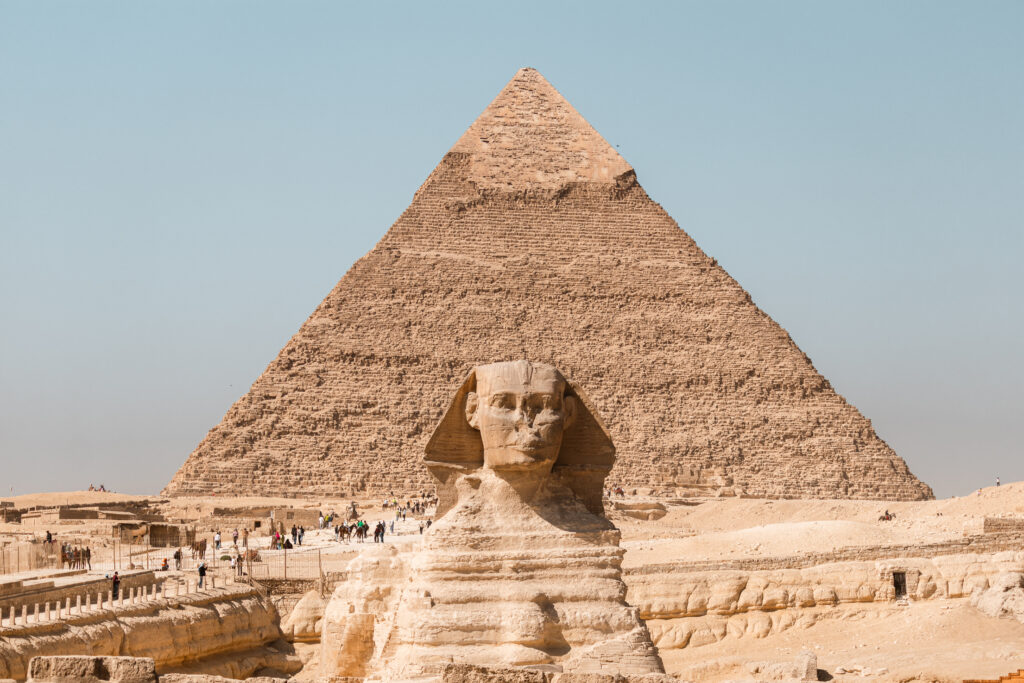 The Sphinx with Pyramid of Khafre in the background
The Sphinx with Pyramid of Khafre in the background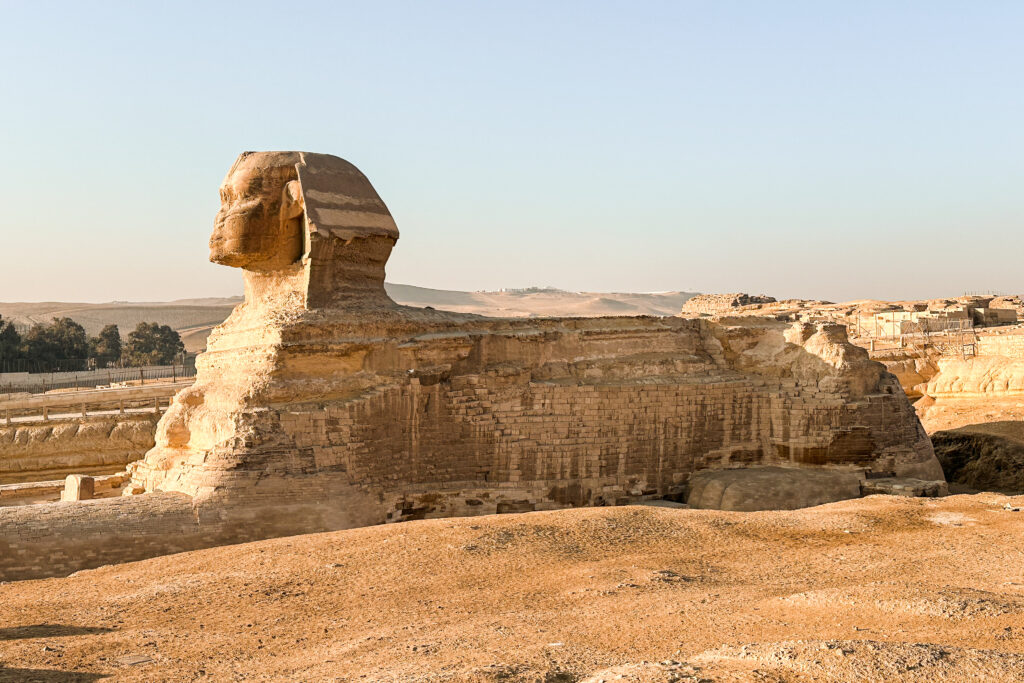 Side View of the Sphinx
Side View of the Sphinx
2. Explore the Great Pyramid of Khufu
Make your way to the Great Pyramid of Khufu, the largest and oldest of the three. You can walk around all four sides of the pyramid and even climb a few of the lower blocks. If you plan to go inside, do it now, as it’ll get very crowded later.
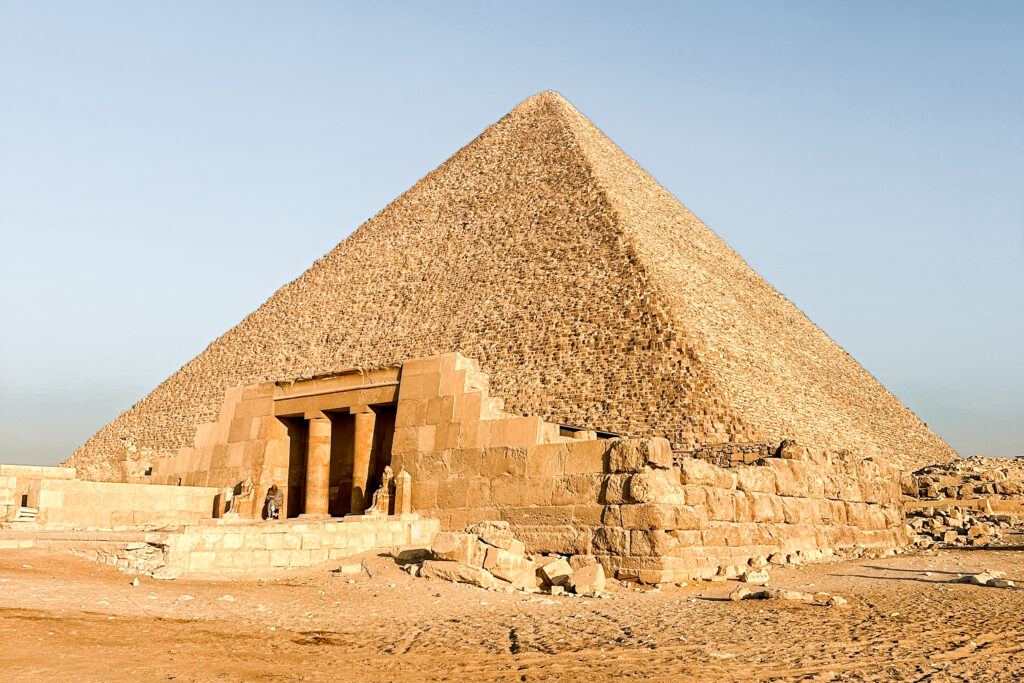 Great Pyramid of Khufu (Entrance)
Great Pyramid of Khufu (Entrance)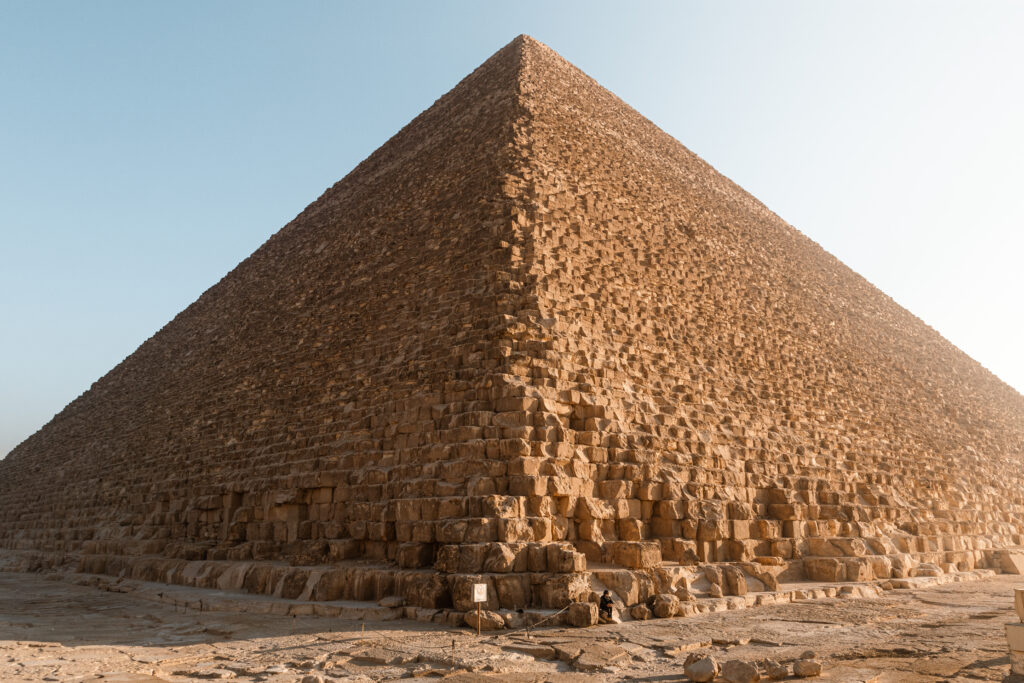 Great Pyramid of Khufu
Great Pyramid of Khufu
3. Walk Uphill to the Pyramid of Khafre
Continue uphill toward the Pyramid of Khafre, the second-largest on the plateau. It’s the one that still has a portion of the original smooth casing stones at the top.
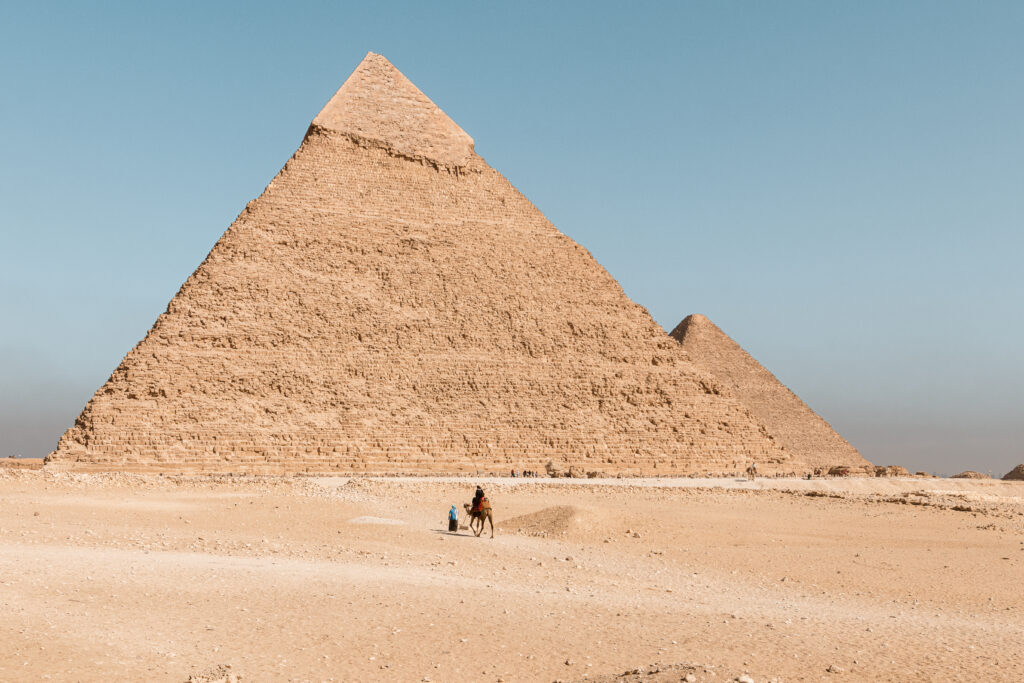 Pyramid of Khafre with Great Pyramid in the distance
Pyramid of Khafre with Great Pyramid in the distance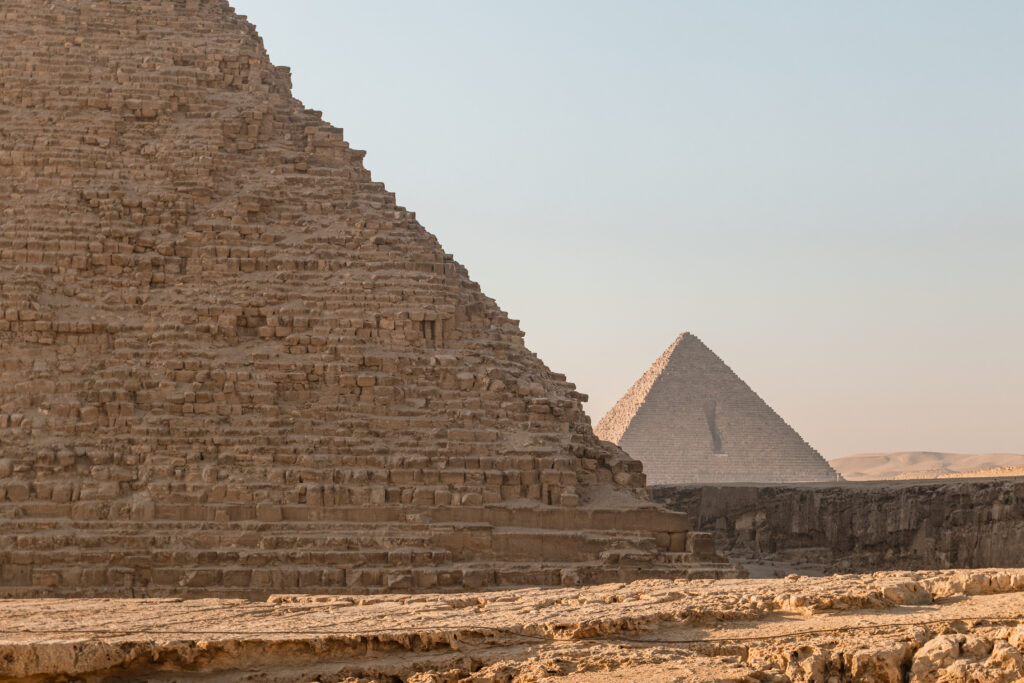 View from Pyramid of Khafre with the Pyramid of Menkaure in the distance
View from Pyramid of Khafre with the Pyramid of Menkaure in the distance
4. Walk to the Panoramic Viewpoint
Now head west, behind all three pyramids, to the panoramic viewpoints. This part is more exposed to the desert and usually quieter, as fewer tourists walk this far. You’ll get amazing views of all three pyramids aligned all to yourself. And then walk back to the entrance through the Pyramid of Menkaure, the smallest of the three pyramids.
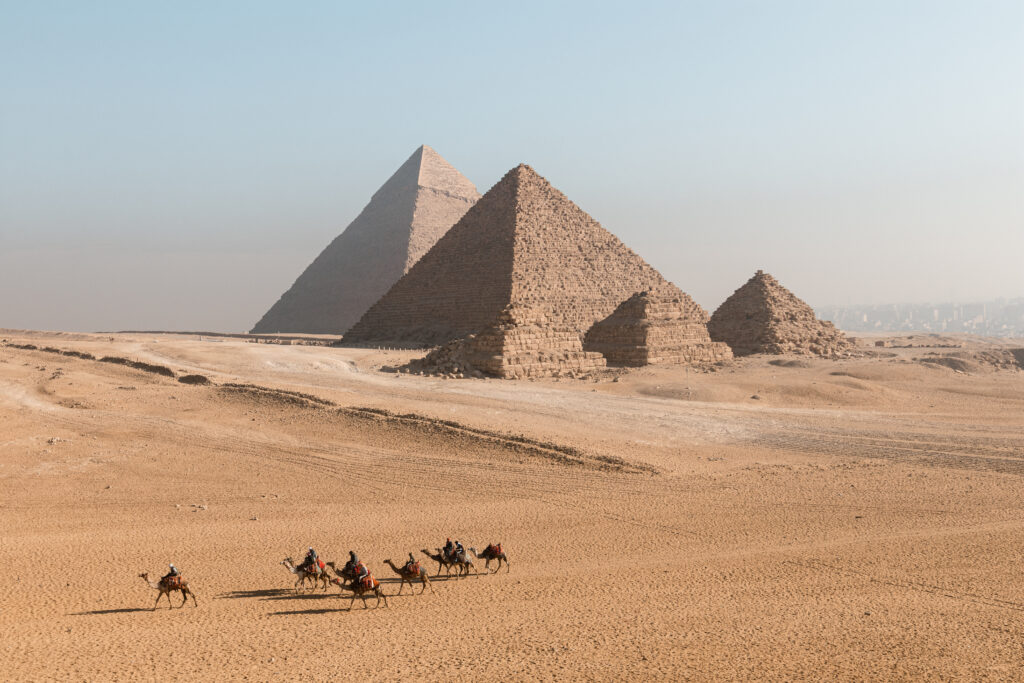 5 Pyramids Viewpoint
5 Pyramids Viewpoint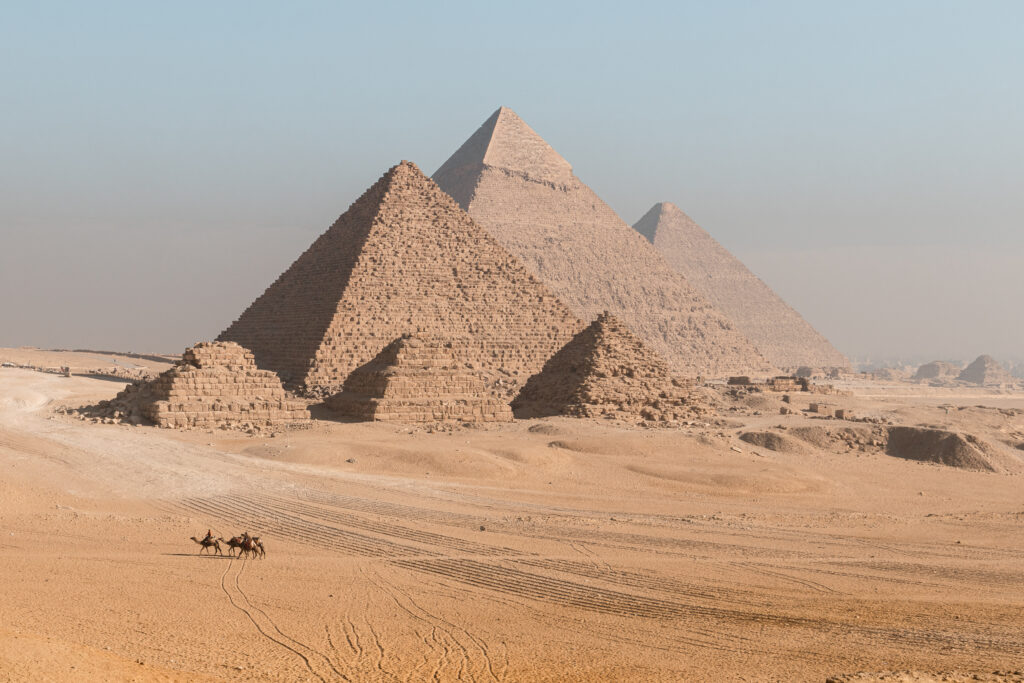 6 Pyramids Viewpoint
6 Pyramids Viewpoint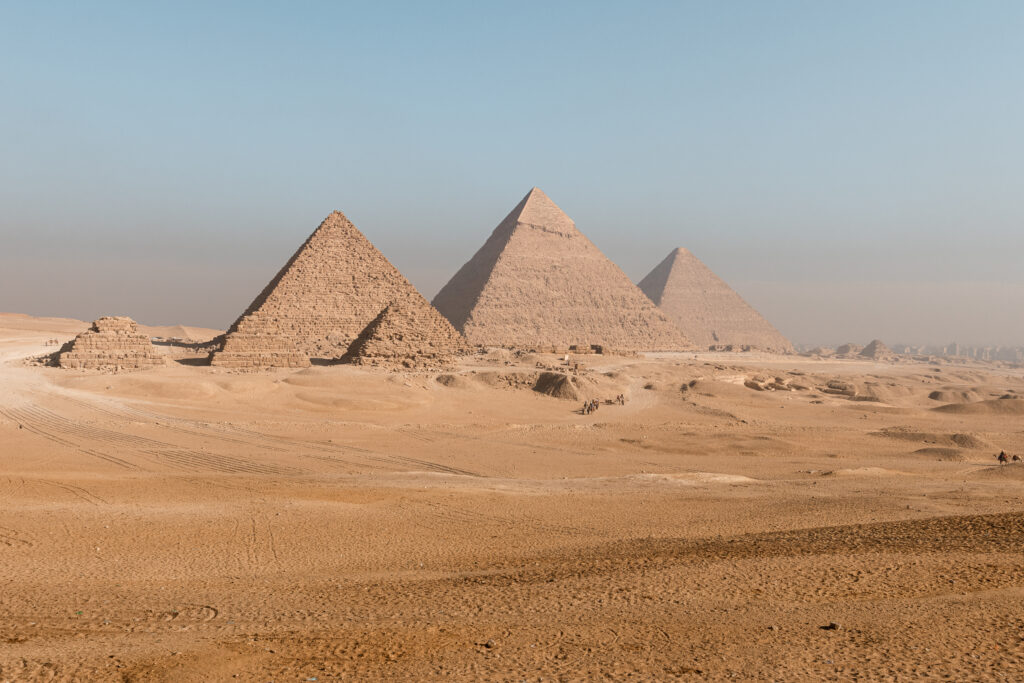 All the Pyramids Viewpoint
All the Pyramids Viewpoint
Safety and Practical Tips
While visiting the Pyramids is generally safe, there are a few things to keep in mind to avoid common scams and unnecessary stress:
Final Thoughts
Visiting the Pyramids of Giza is an unforgettable experience. Standing in front of these ancient wonders is genuinely inspiring, no matter how many photos you’ve seen before. But while the site itself is incredible, the experience around it can be frustrating if you’re not prepared. From persistent sellers to unexpected scams, Giza isn’t the easiest place for independent travellers, but it is doable.
With the right mindset, a bit of patience, and these tips in hand, you can absolutely explore the Pyramids without a guide, avoid the tourist traps, and keep your budget intact. All the struggle will be worth it just to witness the last remaining wonder of the ancient world with your own eyes.
Just remember: go really early and leave before midday. That way, you won’t have to deal with the heat, the crowds, or the most of the seller and scammers.
Want to Continue to Explore Egypt Independently?
If you’re planning a solo adventure across Egypt and want more tips, itineraries, and budget travel advice, check out my How to Backpack Egypt Independently: A Budget Travel Guide. This comprehensive guide includes all the information you need to travel Egypt on your own, from must-see sites to tips on getting around on a budget. Whether you’re exploring the wonders of Luxor, trekking through the Sinai Peninsula, or relaxing in Aswan, this guide will help you make the most of your Egyptian adventure.
